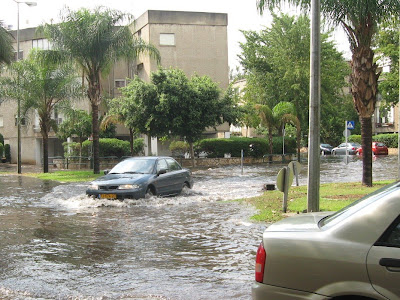But since we started taking some simple measures to save water, this happened to our water bill:
Now take into consideration the fact that Hebrew goes from right to left, and look at that bill again.
That's right.. we went from using more than 20 cubic meters of water every two months (for just two people-- yikes) to using, recently, just 10. We literally used half the water in September-October this year compared to September-October last year. I'd call that results!
These are some of the things we started to do differently... I'm going to be really honest here, so I'm sorry if this means you no longer want to sit next to me on a bus or set foot in our apartment. :)
1. We don't flush our toilet every time. You know, "if it's yellow, let it mellow, if it's brown, wash it down." When I do flush, I always use the little "half-tank" lever rather than the big "full-tank" lever. (Israeli toilets have two different flush settings.) Yes, letting yellow mellow is a little gross, but on the plus side it has made me much better about remembering to put the toilet lid down. (Putting the top lid down was a really hard skill for me to learn. I have much more appreciation for my husband's consistency in putting the seat down now!) This alone saves a TON of water, especially because I work from home and have a notoriously small bladder. Isn't it insane how much treated, cleaned, potable drinking water we just flush down every day? We started being strict about not flushing in the spring of this year, and you can see the difference in our water usage. In our next apartment, we're going to hook up our toilet so that we can flush using the "gray" water we collect from our shower. Which brings me to...
2. We save water from our shower, mostly just from that cold water that runs as we wait for the hot water to arrive. We put this water into buckets and use it for things like watering plants and mopping the floor. Again, it's insane just how much perfectly good water we were throwing away. I end up with more water than I know what to do with.
4. I wash dishes like an Israeli Follow the link to learn how. I've now started to put all my dishes in the sink when I rinse off the soap, so the water rinsed off one dish starts to clean the next. I'm thinking now that I can start collecting that mostly-clean water in a bin and use it to soak my dishes for next time. I don't have a dishwasher, so this is the best I can do for now. I'm trying to convince my husband that we never need to wash dishes at all... imagine how much water we'd save. (I'm kidding! Mostly. Some of you suggested switching to plastic plates to save water, but because our shortage is year-round, I think we'd do more harm to environment than good that way.)
5. I don't do silly things like wash my sheets every week or my jeans and sweaters every day. It's for the Kinneret, people.
Now that it's winter, we need to make even more effort to saving water so that we have water to use next summer. 2.5 cubic meters per person per month still sounds like a lot, though, and I want to try to cut our water usage down more. Any suggestions? What do you do to save water? How much water do you use each month?










